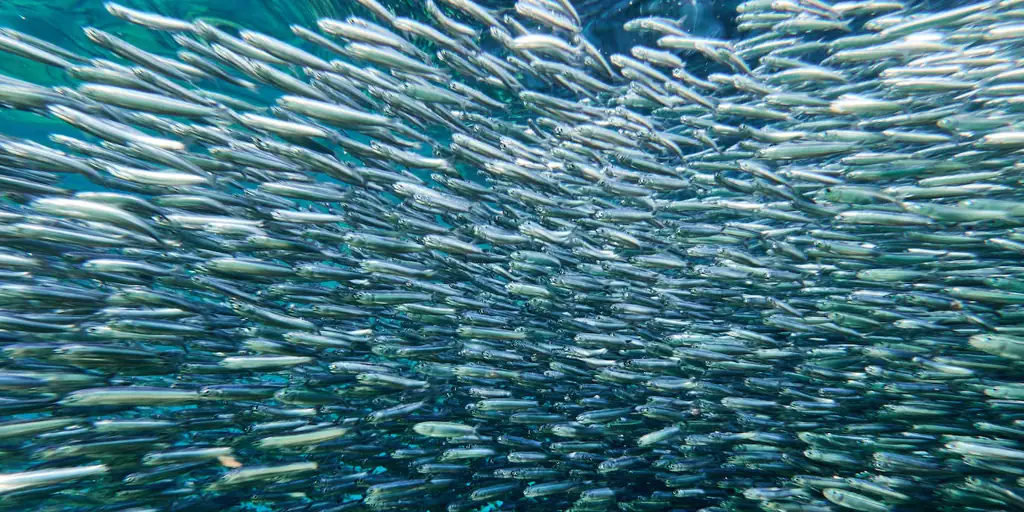A study on the unexpected consequences of the sexual life of anchovies in which researchers from the Spanish Institute of Oceanography and the Institute of Marine Research (IIM) participated has won an Ig Nobel Prize. [aquí, la lista completa], a parody of the Nobel Prize awarded by the humor magazine ‘Annals of Improbable Research’ that each year recognizes the most absurd and unusual research. The Spanish study, carried out in the Ría de Pontevedra, discovered that when these fish mate, the waters of the Atlantic stir like a great storm.
The researchers analyzed ocean turbulence for 14 days off the coast of Bueu and noticed that it increased 10 to 100 times when anchovies gathered to mate during the spawning season. Then, the females release the eggs, and the males release the sperm to fertilize them. The turbulence of the waters caused by the fish frenzy was comparable to that caused by storms, gales and other natural phenomena, especially if they occurred near the coast. The study was published in the journal ‘Nature Geoscience’ in April 2022.
“Initially, this work was not funny nor did we expect it to have a funny impact. We never imagined that they would give us an Ig Nobel but we are excited. We love that science is funny and sarcastic. This way, it has much more scope,” he says. Esperanza Broullón, predoctoral researcher at the University of Vigo and co-author of the study, told this newspaper.
His colleague Bieito Fernández, an oceanographer at the University of Southampton, holds the same opinion. “They are very interesting awards because what they say is true, that first they make you laugh and then they make you think, and if with this someone understands better how the ocean works, it is worth it,” he says. Plus, “we like to laugh at ourselves.”
For the work, winner in the Physics category, the researchers made use of the acoustic echo sounder installed on the Ramón Margalef oceanographic vessel of the Spanish Institute of Oceanography (IEO), which recorded echoes concurrent with the increases in turbulence attributable to the aggregations of the fish.
Although Spanish researchers are not usually abundant in the Ig Nobels (it is clear that they are very serious workers), this year they do a double. The Communication award has a national contribution: a study of the mental activities of people who are experts in speaking backwards, whose objective is to know how the human brain learns to identify the different sounds that make up words. Researchers from the University of Malaga and the Bellvitge Biomedical Research Institute have participated.
The smart toilet
Also notable among this year’s winners is a Polish study on why scientists lick rocks. Apparently, the mineral particles within rocks stand out better on a wet surface than on a dry one, so licking the rocks makes their identification easier. The practice allows scientists to recognize rocks by their taste. He has won the prize for Chemistry and Biology.
The Public Health is a pioneering device that perhaps one day we will all have at home: the Stanford toilet, a ‘smart’ latrine that can know the health of the user through their urine and feces thanks to its different technologies. A test strip analyzes urine for signs of infection and disease, while a computer vision system calculates the amount of urine released and the rate at which it has been expelled. Also keep an eye on the ‘anal footprint’, the unique characteristics of each person’s anus. Its creators are South Korean and American.
The Ig Nobel Prize in Medicine is one of the best. It found its way to an international team that examined the noses of human corpses to determine whether there are the same number of hairs in each nostril. They say their findings could help patients with alopecia. Another group has excelled at using dead spiders as mechanical grappling tools. A contribution to the field of ‘necrobotics’, which consists of recovering corpses to build robots. It is the Biomechanical Engineering award.
Some of the brilliant winners collected their prize last night in an online ceremony where it is a tradition to throw paper airplanes and celebrate madness. All winners received a fake 10 billion dollar Zimbabwe bill. Parody distinguishes research that at first may seem absurd or downright stupid, but that has scientific interest. As their organizers say, they are “achievements that first make you laugh and then make you think.”
